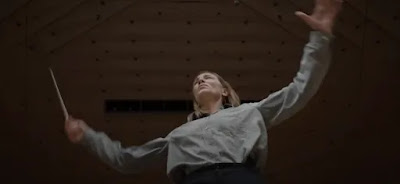Lydia Tár is a brilliant conductor. She can read all the nuance embedded in a sheet of music, feel deeply the gestures and textures of a composer’s choices, and expertly sculpt an orchestra into ecstatic musicality. To listen to a great piece of music with her, or to sit at a piano and see her pull beautiful notes out of the air, you can see her lose herself in its power. She’s also willing to give the benefit of the doubt to the great composers of the past, to see their intent and try to realize it ever better for contemporary audiences. How interesting, then, that she’s so quick to ignore the nuance, the gestures, the textures, of the people in her life. And as for the benefit of the doubt, well, that she only reliably extends to herself. Todd Field’s Tár is a fascinating character study of this fictional woman, and an ice-cold dissection of this peculiar trait of some powerful artists: an ability to bring so much empathy and emotionality into their work that they have little left over for anyone else.
Cate Blanchett plays Tár with imperious confidence in her job. As she rules over the Berlin Philharmonic with an iron grip, we see how, with a wave of her hand, the orchestra blasts bombastic power to the rafters or, in a quick flick of the wrist, falls dead silent. She extends this control in backroom negotiations and extemporaneous lectures, too. She stalks the stage of a college classroom, casts sharp eyes on underlings as they swiftly act on her command, and snaps off learned analysis in interviews and lunches with various high-culture interlocutors. But, for an actress so supremely in control, Blanchett is also quite good at showing the seams around the surfaces of this woman’s life, the quiet insecurities, easy entitlement, and fierce temper battling beneath her regal posture. These are imperfections that can lead to an unravelling, a loose end that frays with her sense of self. Tár has, after all, become used to the status—feted and praised until fettered with the very privilege that affords her multiple fancy apartments, private intercontinental flights, and ready access to eager, vulnerable, starstruck people who end up exploited in one way or another for a chance at breaking into a career in the arts. Tár’s sense of privileged and narrow focus leaves her blind to mistakes this hierarchy breeds.
Field, the writer-director behind deeply felt, finely-tuned dramas In the Bedroom and Little Children, here shapes a film that’s imposing and inviting, drawing us into a specific world populated with fascinating figures. It’s simultaneously a relatively straightforward character study and a cold work packed with elusive and mysterious detail, puzzling elisions, and tantalizingly unresolved facets of plot and character. (“Loose ends,” an important one-scene character shrugs toward the end of the nearly three-hour runtime.) Around Tár we find: her wife and daughter, her personal assistant, various orchestra players and staff, potential lovers, rival conductors, fawning fans, retired musicians, and mysterious missives from a troubled former mentee. For each, she’s, almost unconsciously, putting on a show to maintain her prestige, and her relationships, as facets of the self she’s built for display. This potential material for modern melodrama is kept on an ominous low boil under a frosty surface as Field carefully frames his figures in imposing structures—both literal, in Berlin blocks, roomy apartments, and New York streets, and metaphorically, in the levels of bureaucracy and embedded prejudices within this rarified air.
Within these spaces, during these few weeks in the life of its characters as they prepare for a book launch and a recording of a piece by Mahler, is a sharp statement about how complicated life is. Particularly, this complication is rooted in the thorny discussions of what to do about great art made by troubled, or troubling, artists. It does so by not only seeing this conductor in all her potential for destruction in her own life and in the lives of others, but by considering the art world’s culpability in uplifting and maintaining the structures that enable those like her, and those worse than her. And yet, such beautiful, imposing, enveloping music! The movie pointedly passes by every potential off-ramp of easy explanation, simple judgment, or pat conclusions. Fittingly, it has a gray palate—stone and glass—and a spacious soundtrack full of pregnant pauses and unspoken implications between the symphonic movements. And the film moves with metronomic certainty, stepping so surely as it presents a fully-realized character (and, in its most uncomfortable moments, a performance that’s a performance of a performance) in all her successes and talent, and her irreconcilable flaws and foibles. How true. Why, to reflect on the film is to reflect on a character who almost feels like a real person we’ve met.


No comments:
Post a Comment